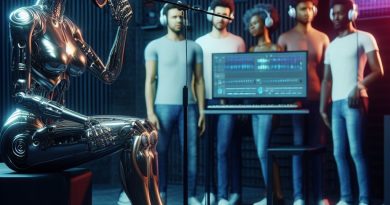Best Poetry Generators- Transforming Words into Art: A Beginner’s Guide to Composing Poems with AI
Last Updated on September 28, 2023
Are you an aspiring poet looking for a fresh approach to your craft? Or perhaps you’ve always wanted to dip your toes into the world of poetry but felt intimidated by the thought of finding the right words to express yourself? Well, look no further. In this beginner’s guide, we’ll show you how to write a poem using AI.
Artificial Intelligence, or AI, has made remarkable advancements in recent years, and now we can harness its power to create beautiful poetry. From generating captivating verses to helping you refine your ideas, AI tools are now a poet best friends.
Whether you’re seeking inspiration or need assistance in crafting a specific style or theme, AI-powered platforms can provide a wealth of resources and ideas. By combining your own creativity with the suggestions and insights offered by AI, you can elevate your poetry to new heights and explore uncharted artistic territories.
How AI-Generated Poetry Works

AI-generated poetry operates on the principles of machine learning and natural language processing. These technologies enable AI systems to analyze vast amounts of text data, including existing poetry collections, literature, and even social media posts. By identifying patterns, themes, and linguistic structures, AI can generate original poetic compositions.
When you input a prompt or a few lines of poetry into an AI-powered platform, the system uses its algorithms to analyze the patterns and structure of the text. It then generates a response that aligns with the style and tone of the input. The more data the AI system has access to, the better it becomes at creating coherent and aesthetically pleasing poetry.
Using AI-generated poetry as a starting point can spark your imagination and help you overcome writer’s block. You can take the generated verses and further refine them, adding your unique voice and perspective to create a truly original piece of art.
However, it’s important to note that AI-generated poetry is not meant to replace human creativity. Instead, it serves as a tool to inspire, assist, and collaborate with poets, offering new perspectives and possibilities.
AI Poetry Generators (Free)
Before we dive into the world of AI-powered poetry, it’s important to have a solid understanding of the basics of poetry composition. Poetry is a unique form of artistic expression that allows us to convey complex emotions, thoughts, and ideas through the careful arrangement of words. It involves the use of various literary devices such as metaphors, similes, and imagery to create vivid and evocative imagery.
To compose a poem, you need to consider elements such as rhyme, rhythm, meter, and structure. These elements help give your poem a distinct flow and musical quality. Understanding the different poetic forms, such as sonnets, haikus, and free verse, can also be beneficial in expanding your repertoire as a poet. Let’s look at some AI poetry generators and what kind of features they offer.
Chat Gpt
If you haven’t heard of Chatgpt by now you probably didn’t have an internet connection over the past few years. Since this is the go to tool for AI generated content I thought to try it out first.Here is the result:
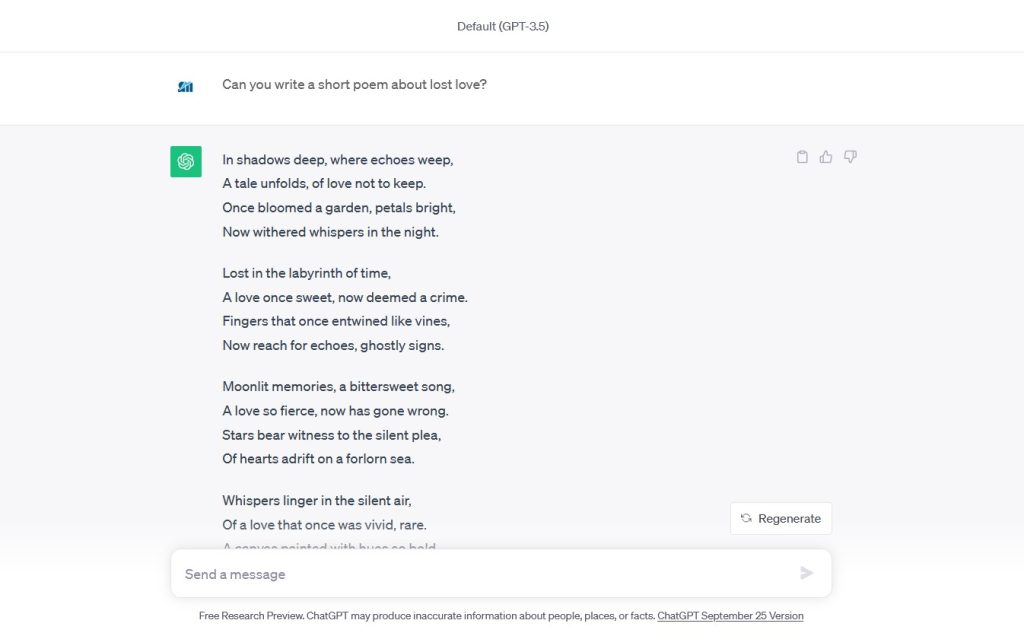
Aipoemgenerator.org

Very basic poem generator, I asked it to write a poem about lost love and this is what it came up with (First 3 verses , there were 3 more)
“In the still of the night, I reminisce
Of a love lost, a love I now miss
With every passing day, a tear I shed
For the love we had, that’s now a thread
Once upon a time, we were intertwined
Our souls connected, our hearts combined
But fate’s cruel hand, it tore us apart
Leaving a void that fractures my heart
Lost in the abyss of memories so sweet
Where your laughter echoed, and love did meet
Now all I have are fragments of the past
A treasure trove of love that didn’t last”
Not bad overall, let’;s check out the next one.
Poemanalysis.com
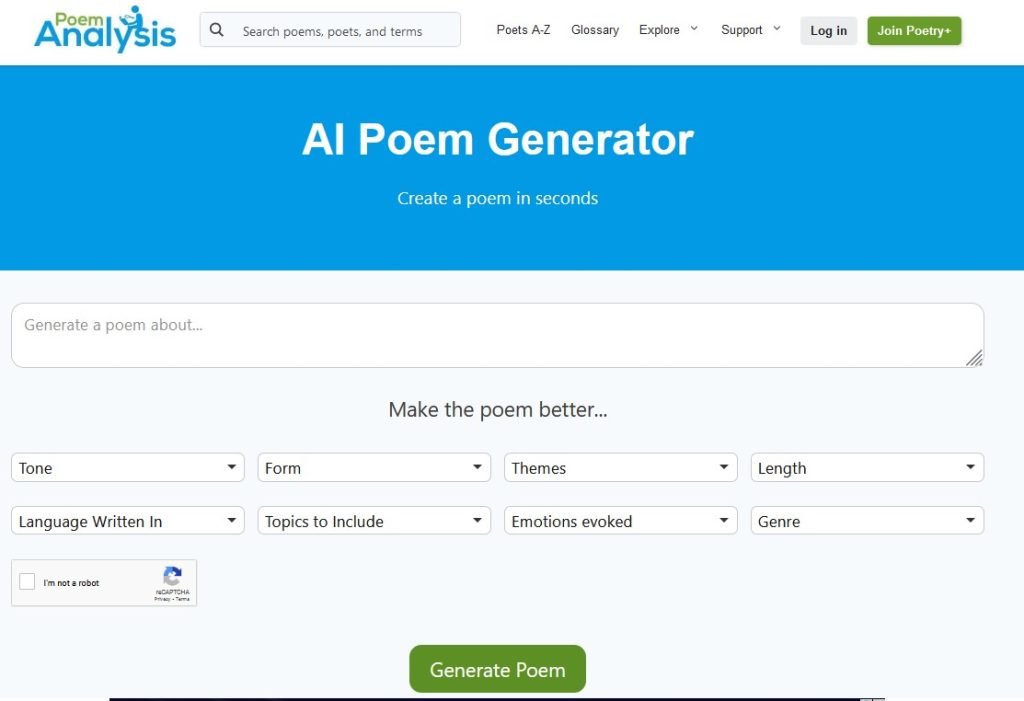
So this tool gives us more advanced options to generate poetry. Tone, form, themes even languages, let’s see what it gives us when we ask for a poem about lost love:

Shadows of the Past
“Silent whispers haunt my restless mind, Hollow echoes of a love that once was mine. All the memories faded, lost and blurred, Distant echoes of a voice no longer heard. Only shadows remain, in darkness concealed, Wandering souls bound to hide what’s revealed. Visions of life’s chapters left behind, Eternal longing for what I cannot find.”Silent whispers haunt my restless mind, Hollow echoes of a love that once was mine. All the memories faded, lost and blurred, Distant echoes of a voice no longer heard. Only shadows remain, in darkness concealed, Wandering souls bound to hide what’s revealed. Visions of life’s chapters left behind, Eternal longing for what I cannot find.”
Poemgenerator.io
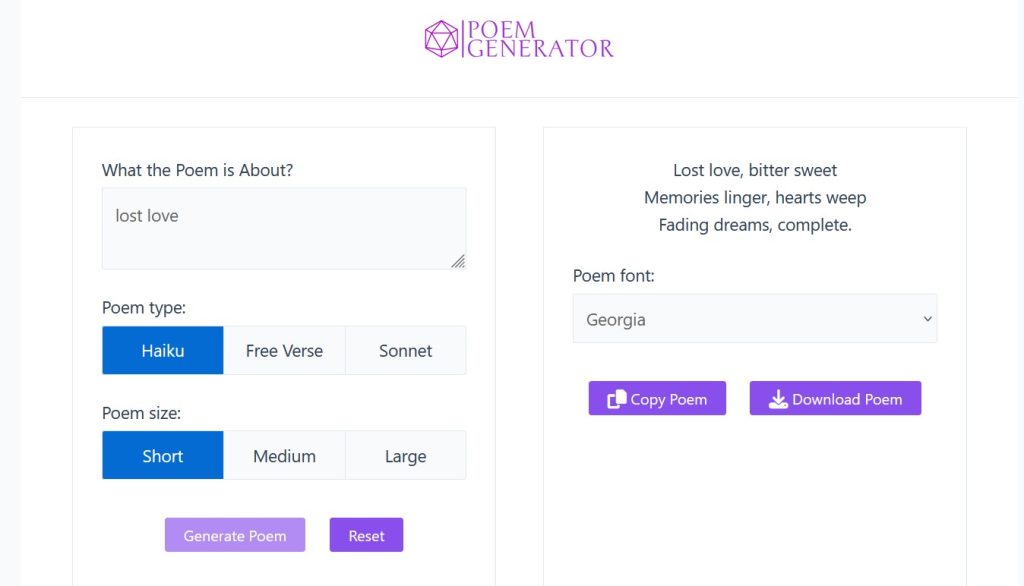
This poem generator has limited options compared to Poemanalysis and it also seems to generate shorter versions of poems. The option of choosing the poem font is a nice addition.
Paraphrasingtool.ai
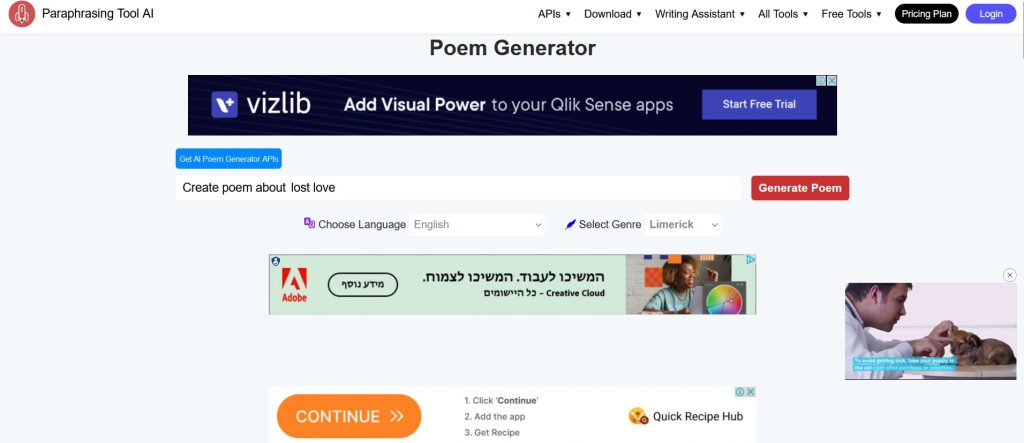
Another basic tool for generating poetry. But there are too many ads plus it requires you to create an account before using it.
Toolbaz.com
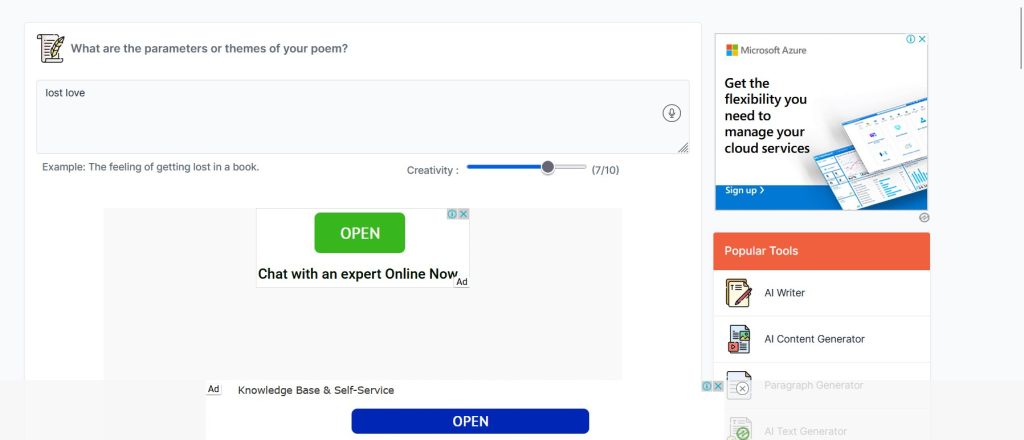
A nice and easy to use interface, this tool generates content very fast. It also has a creativity bar to decide on the level of creativity you like to see. Here is part of the poem I got:
“Lost love, what can I do?
My heart is an empty room
There’s nothing left of you
I woke up from a dream last night
Where you were still in my sight
But when I opened my eyes, I knew
I had to accept that you were through
My heart breaks into a million pieces
As I grasp for the memories
Of the laughter, the fun, and the love we shared
That I can never again compare”
Poetry.tips
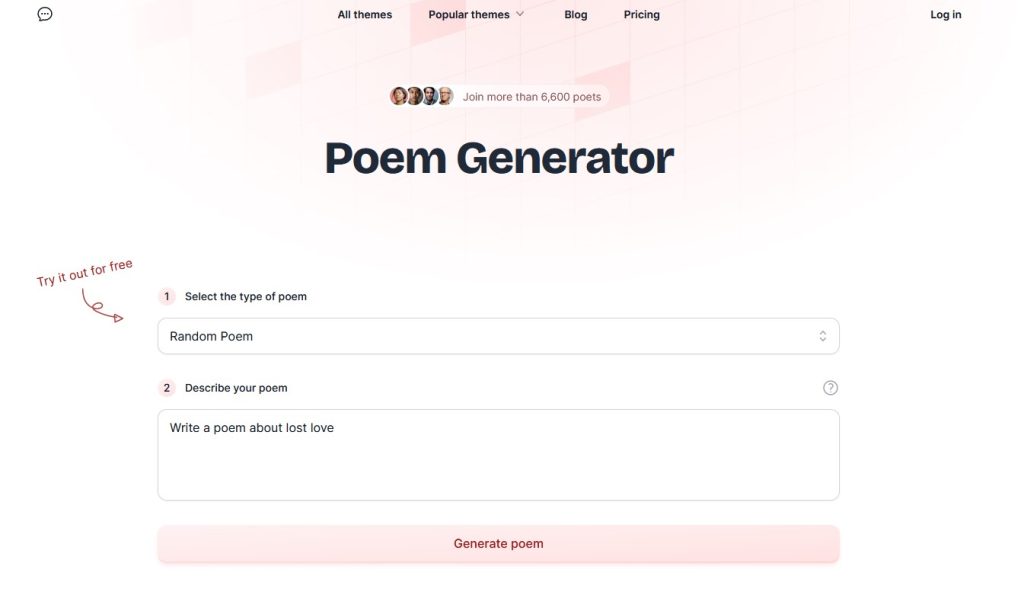
Also nice and easy to use interface, but you need to create an account in order to use it and most of the poem generating features are paid.
Benefits of Using AI in Poetry Composition
Incorporating AI into the process of poetry composition offers several benefits for both experienced poets and newcomers to the art form.
1. Inspiration and Idea Generation: One of the biggest challenges for poets is finding inspiration and generating unique ideas. AI-powered platforms can provide a vast database of poems, literary works, and other sources of inspiration. By exploring these resources, you can discover new themes, styles, and approaches to incorporate into your own poetry.
2. Enhancing Creativity: AI-generated poetry can act as a catalyst for your own creative process. It can help you think outside the box, challenge your assumptions about traditional poetic forms, and encourage experimentation. By combining your unique perspective with AI-generated suggestions, you can push the boundaries of your creativity and produce innovative and thought-provoking poetry.
3. Learning and Skill Development: AI tools can also serve as valuable learning resources for aspiring poets. By analyzing the structure, rhythm, and language used in AI-generated poetry, you can gain insights into the techniques employed by established poets. This can help you develop your own skills and understand the nuances of different poetic styles.
Understanding the Basics of Poetry Composition
Before diving into the world of AI-generated poetry, it’s important to have a solid understanding of the basics of poetry composition. While AI can assist in generating verses and refining ideas, it’s ultimately up to you to shape those words into a meaningful and impactful poem.
1. Meter and Rhythm: Meter refers to the rhythmic structure of a poem, while rhythm is the pattern of stressed and unstressed syllables. Experimenting with different meters can help you create distinctive poetic styles and evoke different emotions. AI tools can provide suggestions for different meters and rhythms, but it’s important to choose the ones that resonate with your intended message and tone.
2. Rhyme and Sound: Rhyme adds musicality and coherence to poetry. It can create a pleasing effect and help reinforce the theme or structure of a poem. AI can generate rhyming words and suggest different rhyme schemes, but it’s crucial to select the ones that enhance your poem’s meaning rather than relying solely on AI-generated suggestions.
3. Imagery and Symbolism: Poetry is known for its ability to evoke vivid imagery and convey abstract concepts through symbolism. AI-generated poetry may lack the depth and subtlety of human-generated verses in this aspect. It’s important to infuse your own creative vision and use AI-generated lines as a starting point to expand upon with your unique imagery and symbolism.
Choosing the right AI tool For Poetry Composition
When it comes to AI tools for poetry composition, there are several options available in the market, each with its own unique features and functionalities. Here are a few factors to consider when choosing the right AI tool for your poetic journey:
1. Data Sources: Consider the data sources the AI tool relies on. Some platforms analyze vast collections of classical poetry, while others incorporate contemporary literature or even social media posts. Choose a tool that aligns with your preferences and desired style.
2. Customization: Look for AI tools that allow you to customize the generated output. This could include adjusting the level of formality, choosing specific themes or topics, or selecting a particular poetic style. Customizability ensures that the AI-generated suggestions align with your artistic vision.
3. User Interface and Experience: A user-friendly interface and intuitive user experience can greatly enhance your interaction with AI tools. Look for platforms that offer a seamless and enjoyable experience, with clear instructions and easy-to-understand features.
Step-by-Step Guide to Composing Poems With AI
Now that you have a solid foundation in poetry composition and have chosen the right AI tool, let’s explore a step-by-step guide to composing poems with AI:
Step 1: Define Your Objective and Theme: Start by clarifying the objective of your poem. What message do you want to convey? What emotions do you want to evoke? Once you have a clear objective, choose a theme that aligns with it. This will provide a framework for your poem and guide the AI tool’s suggestions.
Step 2: Input Your Prompt: Enter your prompt or a few lines of poetry into the AI tool. This can be a starting point for the AI-generated suggestions.
Step 3: Explore AI-generated Suggestions: Review the AI-generated suggestions and select the lines or phrases that resonate with your objective and theme. Consider the meter, rhyme, and imagery suggested by the AI tool, but also be open to modifying or expanding upon them to suit your creative vision.
Step 4: Refine and Edit: Take the selected AI-generated lines and refine them to match your desired style and tone. Add your own unique voice, adjust the rhythm and meter, and incorporate your own imagery and symbolism. This step is crucial in infusing your personality into the poem and ensuring it reflects your artistic vision.
Step 5: Iterate and Experiment: Poetry is an iterative process, and AI can assist you in exploring different possibilities. Experiment with variations of the AI-generated lines, swap words, adjust the structure, and play with different poetic devices. Embrace the creative freedom that AI offers and use it as a tool for constant improvement and exploration.
Tips for enhancing AI-generated poetry
While AI tools can provide valuable suggestions and inspiration, it’s important to enhance the AI-generated poetry to make it truly your own. Here are some tips to maximize the potential of AI-generated verses:
1. Inject Your Voice: Use the AI-generated lines as a starting point and inject your own unique voice and perspective. Add personal experiences, emotions, and insights to make the poetry more authentic and reflective of your individuality.
2. Experiment with Structure: AI-generated poetry often adheres to traditional structures and forms. Break free from these constraints and experiment with different structures, line breaks, and stanza arrangements. This can add an element of surprise and uniqueness to your poetry.
3. Incorporate Personal Imagery: AI-generated poetry may lack personal imagery and symbolism. Infuse your own experiences, memories, and observations into the poem. This will add depth and authenticity to your work, making it more relatable and engaging for readers.
Challenges and Limitations of AI-Generated Poetry
While AI-generated poetry offers immense potential, it also has its limitations and challenges. Here are a few to consider:
1. Lack of Human Emotion: AI lacks the ability to truly understand and convey human emotions. While it can generate aesthetically pleasing verses, it may struggle to capture the depth and complexity of human experiences. Infusing your own emotions and personal insights into the AI-generated lines is crucial to overcome this limitation.
2. Lack of Originality: AI tools analyze existing poetry collections and literature, which can limit the originality of the generated verses. It’s important to use AI-generated lines as a starting point and add your own unique voice and perspective to make the poetry truly original and reflective of your own creativity. You can always use an AI content detector to check the originality of your work.
3. Overreliance on AI: Relying too heavily on AI-generated suggestions can hinder your own creative growth as a poet. It’s important to use AI as a tool to enhance your creativity, rather than a crutch that replaces your own artistic vision and expression.
Conclusion: The Future of Poetry Composition With AI
AI has the potential to revolutionize the world of poetry composition, offering poets new avenues for inspiration, creativity, and collaboration. By combining AI-poetry generators suggestions with your own unique voice and perspective, you can create poetry that pushes the boundaries of artistic expression.
As AI technology continues to advance, we can expect even more sophisticated tools and platforms that cater to the specific needs and preferences of poets. The future of poetry composition with AI is exciting, and it holds the promise of unlocking new artistic possibilities and redefining the art form.
Embrace the power of AI in your poetic journey, and let it be your companion as you transform words into art.
Happy writing!
FAQ
You can check out free poem generators like: Aipoemgenerator.org or Poemanalysis.com. You can also use tools like Chatgpt or Bard.
One way to get inspiration is to use an AI poem generator. Simply choose the topic of your song, the tone, the melody and other options and get the first draft written. Than add your own unique personality into it.


